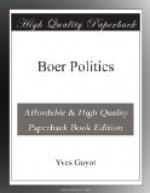True, the Convention prescribed the suppression of slavery; gave guarantees for the safety of the persons and property of alien whites; placed the foreign relations of the Transvaal under the control of the British Government. But, in reality, it was of little value, for the English Resident was in the position of a man who has been conquered with the pretension of controlling the actions of the conquerer.
At the first election under the new conditions, Krueger, who represented the extreme reactionary party, was elected President, although he had accepted office under the British Government, while Joubert, who had declined any dealings with them, was defeated, being suspected of sympathising with the Uitlanders. His defeat does not prove him to have been in the minority. His partisans affirm, with a fair show of reason, that Mr. Krueger never greatly respected the sanctity of the ballot.
6.—Violation by the Boers.
The powerlessness of the British Government to ensure respect for the Convention of 1881, explains its consent to the modification of 1884. “It would be easy to find a casus belli in the behaviour of the Boers,” said Lord Derby in the House of Lords. But the Government had no wish to find one, and added to the weakness it had displayed after Majuba a fresh show of weakness, which convinced Mr. Krueger that the violation of a convention was the easiest method of obtaining anything he wanted.
In point of fact, it is the British Government that is responsible for the present war, through having inspired President Krueger with the conviction, that he had only to continue in 1899 the policy which had succeeded so well in 1880.
CHAPTER IV.
ARTICLES OF THE CONVENTION OF 1884.[7]
1.—Krueger’s Point of View.
Dr. Kuyper has a simple method of solving difficulties. Speaking of Article 4 of the Convention of 1884, which gives England the right of veto on all treaties contemplated between the South African Republic and foreign powers, he says:—
“This is not Mr.
Krueger’s point of view. He, like us, has
always
stigmatised the occupation
of 1877 as a violation of the Sand River
Treaty.”
Mr. Krueger did not stigmatise it thus when he accepted office from the English Government. But, in any case, he was party to the negotiations which resulted in the Conventions of 1881 and 1884. Dr. Kuyper tells us that neither he nor Mr. Krueger recognise them, considering them to have been vitiated by the Annexation of 1877. Be it so; but in that view discussion is useless. Mr. Krueger held them as null and void. He has chosen his own time to declare war. A government has always the right to tear up a treaty just as a private individual has the right to refuse implement of a contract. In the case of the individual, his refusal exposes him to a claim of damages; in the case of a country, the result is war. It is the simplest thing in the world; but then why go seeking for pretexts and explanations, and worrying oneself about making everybody believe that it was England who brought about the war, when after all she was only claiming the due execution of a convention?




